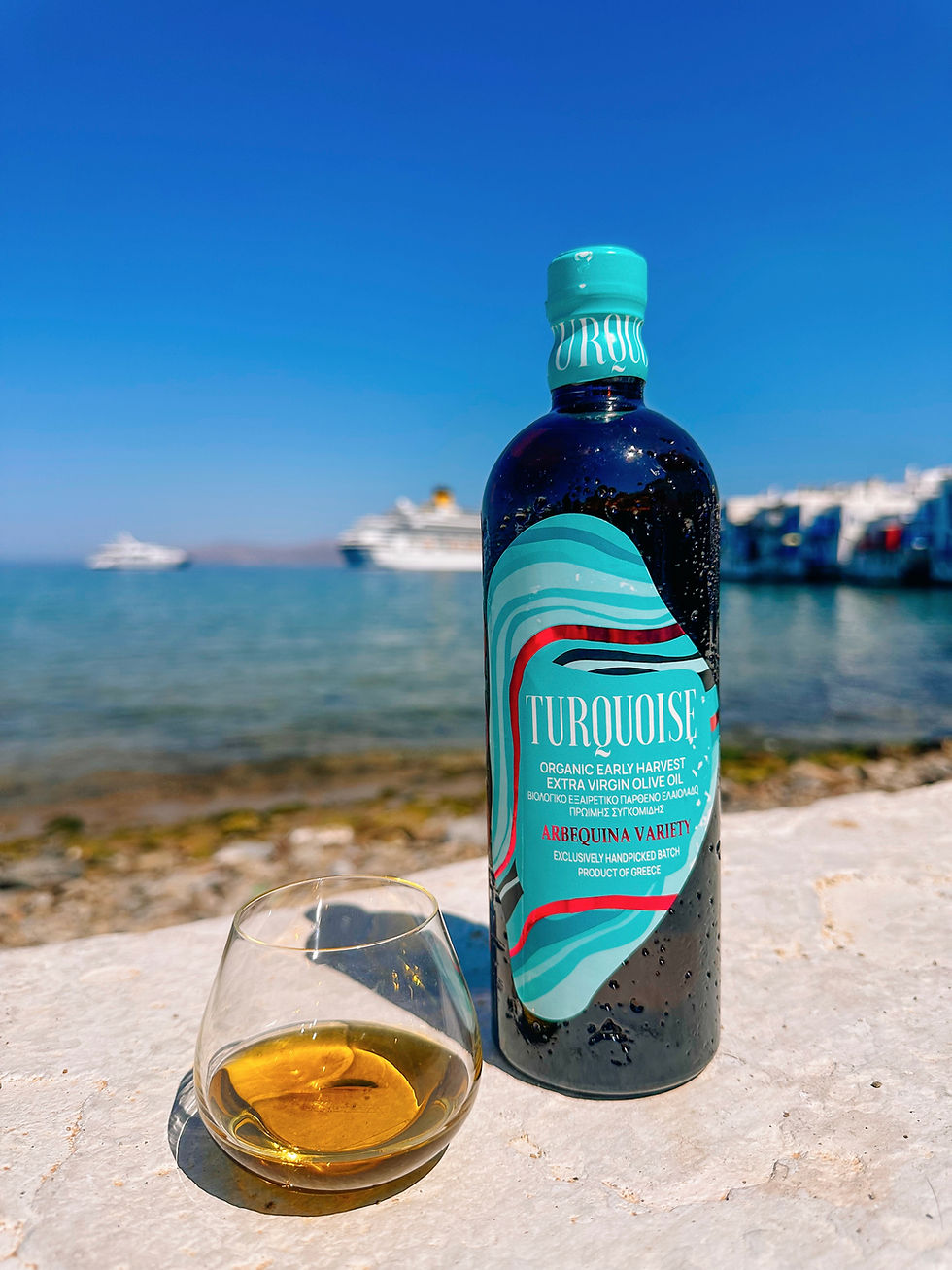Oleocanthal – the Natural Healer
- Mykonos Olive Oil Tasting

- Dec 5, 2018
- 3 min read

Oleocanthal is a phenylethanoid or a type of natural phenolic compound found in Extra Virgin Olive Oil (EVOO).
The importance and uniqueness of Oleocanthal is that it has antioxidant and anti-inflammatory properties. Its anti-inflammatory action on the body is very similar to ibuprofen, one of the no steroidal anti-inflammatory drugs most widely consumed.
Non-steroidal anti-inflammatory drugs (NSAID) such as aspirin, paracetamol and ibuprofen, can be differentiated from the steroidal ones because they have far fewer secondary effects, and its analgesic effect does not belong to narcotics.
On the other hand, this discovery is very interesting, because the NSAIDs have proven to have very beneficial effects in diseases that involve chronic inflammation processes, such as degenerative and neurodegenerative illnesses (Alzheimer). Similarly, some NSAIDs have been associated with less impact on the risk of cancer.
In the last years there have been done some essays to check the potential benefits of Oleocanthal.
The discovery of the Oleocanthal:
Olive oil is ancient but oleocanthal was discovered relatively recently. The discovery of the Oleocanthal has to be attributed to the Doctor Gary Beauchamp. This American scientist and biologist, works for the Monell Chemical Sense Center of Philadelphia, an organoleptic laboratory, that among other activities is dedicated to test different substances and quantify their sensorial characteristics.
Dr. Gary was present in a molecular nutrition congress celebrated in Sicily and he was invited to taste some extra virgin olive oils in a local mill. When he tasted the extra virgin olive oil, (we suppose that had not tasted any good extra virgin olive oils before), he found familiar the pungency that olive oil left him at the end of the throat.
At that time, Dr. Gary was working on an essay on the taste of different solutions of liquid ibuprofen, and the pungency of the olive oils reminded to him the ibuprofen. He ordered some samples to the mill and the rest is history.
Of this story, comes the etymology that Dr. Beauchamp gave to the molecule that he discovered: Oleo-Canth-Al "Oleo" from the Latin, Oil "Acanth" from the Greek, thorn (of the pungency) "Al", from the aldehyde chemical compound chemical.
Specifical reports about the Oleocanthal:
Currently there are many essays s and technical works under investigation about the Oleocanthal.
Perhaps the most spectacular till now has been made by Paul Breslin, colleague of Gary in the Monell Center, along with biologists and oncologists David Foster and Onica Legendre, from Hunter College, which showed that the oleocanthal kills cancer cells in 30 minutes and it does not damage the healthy ones. This report was developed in vitro. The oleocanthal destroys lysosomes, of the damaging cells. Their discovery has been published in “Molecular and Cellular Oncology”.
On the other hand, Amal Kaddoumi and his team, describe in the report published in the prestigious newspaper ACS Chemical Neuroscience, some test results in mice. Mice to which they were given with oleocanthal saw reduced the buildup of beta-amyloid plaque, responsible of Alzheimer's disease.
The information and the current investigations are not conclusive, but they seem to be quite promising.
Recommendations of consumption:
In order that the Oleocanthal may have protective effects on our health, like the rest of the Extra Virgin Olive Oil polyphenols, is recommended a daily and a regular consumption.
In this way, four daily tablespoons of an Extra Virgin Olive Oil rich in Oleocanthal is equivalent to a consumption of 125 mg of ibuprofen, which would be, according to the researchers of the Andalusian society of Oleocanthal, a good basis to prevent or relieve chronic inflammatory processes.




Comments